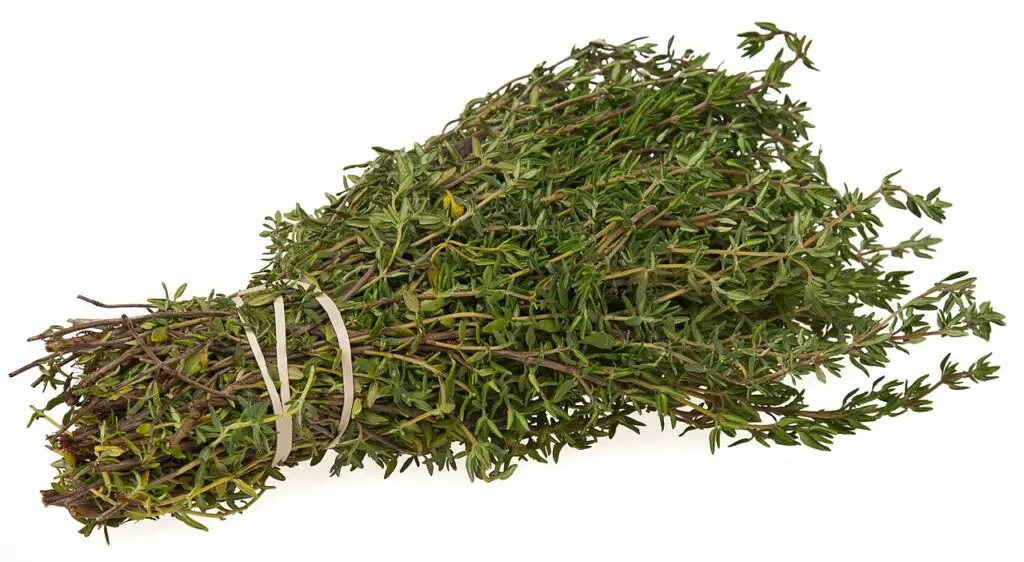Thyme is an aromatic herb that has been used as a flavoring agent and medicine for centuries.
It is packed with antioxidants, vitamins, and minerals which all contribute to its natural healing properties.
In addition to its culinary uses, thyme can also be used to reduce inflammation and treat respiratory problems in humans and animals alike.
Studies show that it can be especially beneficial for treating canine ailments such as asthma, allergies, skin conditions, fleas, and ticks.
Can Dogs Eat Thyme?

Yes, dogs can eat both fresh and dried thyme.
Thyme is a healthy herb that can provide many benefits to your pup’s diet. It’s non-toxic to dogs and contains vitamin C and other nutrients that can boost their health.
When it comes to giving your dog thyme, you should always start with small portions of the herb and make sure you consult your veterinarian before increasing the amount. For example, smaller breeds may only need half a teaspoon per day while larger dogs could handle up to one teaspoon.
If you’re considering adding thyme to your pup’s diet, there are several ways to incorporate it – either in its dried or fresh form.
Some recipes that are suitable for dogs include adding a pinch of dried thyme into their food or making an herbal shampoo with a few sprigs of fresh thyme boiled in water and let cool down before use.
Fresh thyme is also great for adding flavor to homemade treats like biscuits, which need no added sugar due to the natural sweetness from the applesauce and honey used in them.
If treating your pup with some store-bought treats, just make sure they are free of xylitol as this dangerous sweetener is toxic for dogs.
Can Dogs Eat Thyme
How Much Thyme Can Dogs Eat?

The amount of thyme you can give your dog depends on its size and other factors. Generally, it’s best to start with small portions and consult with your veterinarian before giving them more.
For example, small dogs can usually handle half a teaspoon of dried or fresh thyme, while larger breeds may be able to handle up to 1 teaspoon per day.
However, always keep in mind that too much thyme can cause stomach upset in dogs and should be avoided.
Can Dogs Eat Thyme
Thyme Feeding Chart According To Size
| Food | Size | Portion |
|---|---|---|
| Thyme | Toy dogs | 1/2 tsp per day |
| Thyme | Small dogs | 1/2 tsp per day |
| Thyme | Medium dogs | 1 tsp per day |
| Thyme | Large Dogs | 1 tsp per day |
Thyme Feeding Chart According To Age
| Food | Age | Portion |
|---|---|---|
| Thyme | 0 – 6 months | Don’t feed |
| Thyme | 6 – 12 months | 1/2 tsp per day |
| Thyme | 12 – 24 months | 1 tsp per day |
| Thyme | 24+ months | 1 tsp per day |
How Often Can Dogs Eat Thyme
Generally, depending on their size and other factors, smaller breeds may only need one or two meals containing half a teaspoon of dried or fresh thyme every day while larger dogs could handle up to one teaspoon per day.
It is important to keep in mind that too much of this herb can cause stomach upset in dogs and should be avoided.
Can Dogs Eat Thyme
Health Benefits of Thyme To Dogs
- Improved Digestion. Thyme contains anethole, which has antispasmodic and anti-inflammatory benefits that can help with digestive troubles in dogs. It helps relax the smooth muscle of the gastrointestinal tract, reducing an upset stomach and other associated symptoms like nausea.
- Respiratory Infection Prevention. The essential oils found in thyme contain thymol and carvacrol, which have antimicrobial properties that can help reduce your pup’s risk for respiratory infections like kennel cough or bronchitis.
- Pain Relief. The plant enzymes present in thyme can provide relief from pain because they act as a natural analgesic and anti-inflammatory agent, helping to reduce joint pain and discomfort.
- Improved Skin Health. The antioxidant properties of thyme are beneficial for your pup’s skin health as they can help soothe dry patches and improve skin elasticity, leading to a healthier coat overall.
- Better Immunity. The vitamin C found in thyme helps support the body’s immunity while also supporting the development of collagen, allowing your pup to stay healthy!
Nutritional Benefits of Thyme For Dogs
| Thyme Nutrition Facts pet 100 grams | % DV * |
|---|---|
| Calories | 101 |
| Total Fat | 1.7 g |
| Cholesterol | 0 mg |
| Sugar | 0 g |
| Glycemic Index | 15 |
| Sodium | 9 mg |
| Carbs | 24 g |
| Protein | 6 g |
| Vitamin D | 0% |
| Calcium | 40% |
| Iron | 97% |
| Pottasium | 609 mg |
Can Dogs Eat Thyme
Are Dogs Sensitive To Thyme?
Yes, dogs can be sensitive to thyme. If your dog consumes too much thyme, it can cause gastrointestinal upset such as vomiting and diarrhea.
It is important to keep in mind that thyme should only be given to dogs in moderation and not more than one teaspoon of dried or fresh thyme per pound of dog food.
Symptoms of an allergic reaction may include:
- Excessive scratching
- Licking
- Rubbing the face
- Redness or swelling around the mouth or ears
- Hives
- Sneezing
- Coughing.
If you suspect your dog has an allergy to thyme, contact your veterinarian immediately for advice.
How To Prepare Thyme For Dogs
- Thyme Water. To make thyme water, boil four to five cups of water with two tablespoons of fresh thyme or one tablespoon of dried thyme. Strain the tea, then let it cool before providing it to your pup in a bowl. This can help soothe gastrointestinal distress and improve digestion.
- Topical Applications. Thyme oil can be applied directly to your pup’s skin in order to relieve itching and inflammation caused by allergies or eczema. Simply mix a few drops of the oil into one cup of carrier oil like olive or coconut, then apply the mixture directly to the affected area.
- Food Additive. Adding thyme to your pup’s food is an easy way to provide all its many benefits. Start by adding a small amount and gradually increase it over time until you reach the recommended dosage of 1 teaspoon per pound of food served daily.
How Fast Will Dogs Digest Thyme
Generally, it takes about 6 to 8 hours for the body to digest food, so dogs should be able to digest thyme within this time frame.
However, if they are consuming large amounts of thyme, it is important to monitor them closely for any signs of an upset stomach or an allergic reaction.
FAQs
Can Thyme Be Harmful To Dogs In Any Way?
While thyme is generally safe for dogs in small to moderate amounts, it can be harmful if ingested in large quantities.
If your pup eats too much thyme, they may experience an upset stomach, vomiting, and diarrhea.
Additionally, thyme essential oil should never be given to dogs orally; it should only ever be used topically after being diluted with a carrier oil like coconut or olive oil.
Therefore, it’s important to consult with your vet before giving your pup any type of thyme-based remedy.
Can Puppies Eat Thyme?
Puppies can safely eat thyme in small to moderate amounts as part of a balanced diet.
However, due to their smaller size and more sensitive digestive systems, puppies need fewer calories than adult dogs and should not be given too much thyme at once.
It’s best to consult with your vet before giving your puppy any type of thyme-based food or remedy.
Additionally, puppies are particularly vulnerable when it comes to essential oils and should never be given thyme oil orally; it should only ever be used topically after being diluted with a carrier oil like coconut or olive oil.
Are There Any Potential Side Effects of Giving Thyme To Dogs?
If too much thyme is ingested, dogs can experience an upset stomach, vomiting, and diarrhea. Additionally, essential oils such as thyme oil should never be given to dogs orally; they should only ever be used topically after being diluted with a carrier oil like coconut or olive oil.
As with any new food item or remedy, always consult with your vet before giving your dog anything containing thyme.
Related articles:
- Can Dogs Eat Basil? Fresh or Dried, Find Out Now!
- Pet-Friendly Seasonings: Can Dogs Eat Parsley?
- Can Dogs Eat Cinnamon? Explore The Benefits and Risks
- Ginger Woof! Can Dogs Eat Ginger?
- Can Dogs Eat Turmeric? The Super Spice For Dogs!
- Can Dogs Eat Sage? How This Superfood Benefits Your Pooch
- Can Dogs Eat Oregano? The Oregano Debate
- Can Dogs Eat Rosemary? Explore The Benefits of This Pet-Friendly Herb
- Can Dogs Eat Mint? Freshen Up Your Pup’s Breath





Leave a Reply